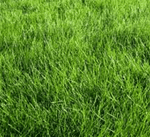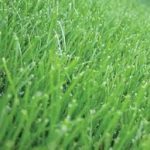Types of Cool Season Grass for Maine Lawns
There are a variety of cool season grass commonly used in Maine lawns. Read more to learn about the different types.
Perennial ryegrass is a dark green, fine-to-medium textured grass. It performs best on well-drained, fertile soils. It is usually grown either alone or in combination with Kentucky bluegrass. When seeded with Kentucky bluegrass, perennial ryegrass should not exceed 10-15% of the seed mix, in order to prevent the bluegrass from being out-competed during the seed germination process. Perennial ryegrass tolerates heavy foot traffic and develops into a durable sod, but it requires more fertilizer and water than other turf grasses. It is a bunch-type grass, and does not quickly form a solid turf when it is grown alone. Also, because perennial ryegrass is fibrous, it is important to mow with a very sharp blade. Not all perennial ryegrasses are winter-hardy in Maine. Over time, they can thin out or even be killed during a cold, open winter. Perennial ryegrass often comprises 5-10% of seed mixes. It functions as a “nurse crop” by germinating in 5-7 days, and protecting the slower germinating grasses.
Kentucky bluegrass is the dominant grass type in traditional northern lawns. A blend of three or more varieties of Kentucky bluegrass forms an excellent lawn in a full-sun, well-drained site with moderate-to-high fertility and regular irrigation. Kentucky bluegrass knits together well because it spreads by underground rhizomes. It tolerates cold winter temperatures and heavy wear, making it an excellent athletic field choice. In the heat of summer, it sometimes becomes dormant and turns brown, but it greens up again when temperatures drop. When this grass is over-fertilized or over-watered, it can develop a layer of thatch (dead tissue at the base of the plants) that interferes with water movement and grass growth.
Tall fescues have been improved in recent years, and are now used as stand-alone blends for low-maintenance lawns in many parts of the country, including Maine. Tall fescues germinate best in very warm soils and are slow to establish into a turf because they are bunch grasses. It is important to control the weeds that can establish in the open spaces among the grass clumps during the first one or two seasons. Tall fescues tolerate heat and drought, and perform well in sun or light shade. However, not all tall fescues are fully hardy throughout Maine. After a cold, open winter, the spring cover may be reduced, allowing weeds to establish and making it necessary to overseed.
Grass mixes are composed of two or more types of grass. Traditional home lawn grass mixes are composed of Kentucky bluegrass, fine fescue, and perennial ryegrass. Such a mix adapts to the range of conditions found in a home lawn; the Kentucky bluegrass tends to dominate in sunny areas, while the fine fescues dominate in shadier and less fertile areas, and the ryegrass is competitive in high-moisture areas.
Endophyte-enhanced grasses have fungi living in them. Endophyte-enhanced varieties of perennial ryegrass, tall fescue, and fine fescues are available. They perform well in low-maintenance and high-stress situations, and resist leaf-feeding insects such as chinch bugs, billbugs, and sod webworms. They do not resist root feeding by white grubs.
Other grasses: Bentgrass is a very fine-textured grass planted on many golf greens, but it is not recommended for home lawns. Annual ryegrassis sometimes added to inexpensive seed mixes, but it is not perennial and is not recommended as a lawn grass for Maine. Warm-season grassessuch as zoysia and St. Augustine grass are sometimes advertised for use in the northern part of North America, but they are not hardy and are not recommended for use in Maine

